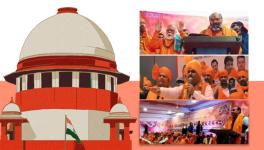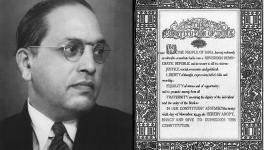Elderly Farmers Thank SC for ‘Concern’, Refuse to Return Until Farm Laws Repealed
New Delhi: They are elderly farmers above the age of 70; extremely vulnerable to several diseases, yet remain resilient. They are not ready to move an inch till the three Farm Laws enacted by the Centre in September last year are repealed.
The farmers say that can see through the Supreme Court’s apparent concern for their health. They allege that the court took an “extremely blatant pro-government stand. Had the apex court been guided by a sense of justice, it would not have appointed a committee of people supporting the government’s stand from day one,” they said.
While hearing a batch of petitions seeking the removal of protesters who have been camping at five entry points to the national capital for the past 48 days, Chief Justice of India (CJI) S.A. Bobde on January 11 suggested that the elderly and women protesters return home.
“I want you to tell them (women and elderly agitators) that the CJI wants them to go back. Try to persuade them,” he told advocate Dushyant Dave, who was representing the farmer unions. The CJI’s observation came after the senior lawyer submitted that he would seek further instructions from his clients after the court said it would record his statement that there would be no tractor rally in Delhi on Republic Day (January 26).
Amid a deadlock in negotiations between the agitating farmer unions and the government, with the former demanding a withdrawal of the three laws and a legal guarantee for a minimum support price (MSP) and the latter not ready to budge, the top court, in its order on January 12, stayed the three controversial Farm Laws till further orders and formed a four-member panel to speak to all stake holders and submit a report in two months for the court’s understanding.
Reacting to the SC’s oral observation, 71-year-old Pritam Singh Kanjla, a retired employee of the Punjab’s education department, who is well versed in Urdu, recited a well-known couplet written by revolutionary poet Faiz Ahmed Faiz:
“Kisey vakil karen, kis sey munsifi chahen?
Tumhi vakil, tum hi muddai, tumhi munsif.”
(Who should we engage as a lawyer, where shall we seek justice because you are the lawyer, you are the complainant and you are the judge as well)
The farmer from Sangrur expressed his anger and disappointment over the SC’s order; he alleged that the top court in the country had also “fallen in line like other institutions”.
“We respect the Supreme Court, but it offers little hope of justice. Tuesday’s order proved our apprehensions to be true. We want to tell the honourable CJI that we will return only after the three laws are rolled back,” he told NewsClick, adding: “maut ek din aani hai to kyun na ek achche cause ke liye jaan diya jaye (since death is certain why not die while fighting for a good cause)”.
“Why should I or any other elderly person go back?” asked 85-year-old Nachhatar Singh Garewal. He said he had been camping at the Singhu border since November 26 and will continue to stay till the “end”.
Sitting on a mattress in the open with a red flag in his hand, the resident of Burj Hari Singh Wala village at Raikot tehsil in Punjab's Ludhiana district said his dead body will return if the government does not agree to the demands of the striking farmers. “It does not matter if we die as our children will replace us,” he said and added: “If we withdraw, it will discourage the younger generation of protesters.”
When reminded that he was at an age when people needed to rest and avoid the harsh weather, he said physical comfort was a privilege not in the farmers’ “destiny”. “We are not tired; we will keep fighting till our organs are functioning,” he added.
Seventy-year-old Hardev Singh from Tarn Taran in Punjab said while he appreciates the SC's concern, to return without a solution to the dispute was out of question.
“Everyone – be it the SC or the government – must understand that our fight is not just to protect our land. Our culture, heritage and existence are at stake. What will we do after going back when all these things are lost?” he asked. He said even if the top court had passed an order for their eviction from the protest sites, no one would have left them.
“When we were coming here, we had told our family members that we would return home only after the three laws were repealed. How can we betray our own resolve?” he asked.
Jagir Singh, 65, a fellow villager, said the facilities available at home were not available here, but their needs were being taken care of by people. “We don't have any problem here. We are provided with hygienic food and our medical needs are being addressed. Farmer unions, volunteers, different NGOs and common people are ensuring that we don’t suffer in this harsh weather. But above all, a protest is a protest. Spending the night in the open in this bitter cold is not easy, of course. Still, our morale is high and we will fight till the end,” he said.
Johar Singh, 72, a resident of Rajpura in Punjab's Patiala district claimed their resolve to stay till the end came from their families, who are also taking part in the historic agitation. “They encourage us to keep fighting. Hamen apna morcha fateh karna hai (We have to win the battle),” he added.
To 65-year-old Swarna Singh, age is just a number which does not affect one’s resolve. “We are not scared of death. It’s better that the Supreme Court, instead of indulging in lip-service, does something meaningful. If the court is really serious, why has the Swaminathan Commission’s recommendations not been implemented so far? Why has there been no hearing on the petition challenging the constitutional validity of the three laws?” he asked.
Swarna Singh, 82, from Atari village in Amritsar district, said the apex court took up a matter which allegedly suited the government. “But we want to make it clear that we won’t return home till the government sets aside the three laws which are aimed at giving the agricultural sector to corporates,” he concluded.
Farmers at the Ghazipur (Delhi-Uttar Pradesh border) also maintained the same.
“We won't return home till our demands are met. It’s better to die protesting the black laws than sitting idle at home,” said 97-year-old Surajpal Singh from Muzaffarnagar in Uttar Pradesh.
With folded hands, he urged the court not to pass any judgment which may create a law and order situation.
The Supreme Court on Tuesday set up a four-member committee comprising agricultural economist Ashok Gulati, Bhupinder Singh Mann of the Bharatiya Kisan Union, Anil Ghanwat of the Maharashtra-based Shetkari Sangathana and Dr. Pramod Kumar Joshi to negotiate with striking farmers and submit a report to the court.
All the four members of the panel have come out in support of the three laws earlier, with a few among them asking for certain amendments.
Farmer unions have already refused to talk to any such committee, arguing that they will only negotiate with government representatives.
The laws in contentions are: The Farmers (Empowerment & Protection) Agreement of Price Assurance & Farm Services Act, 2020, The Farmers Produce Trade & Commerce (Promotion & Facilitation) Act, 2020 and The Essential Commodities (Amendment) Act, 2020.
Get the latest reports & analysis with people's perspective on Protests, movements & deep analytical videos, discussions of the current affairs in your Telegram app. Subscribe to NewsClick's Telegram channel & get Real-Time updates on stories, as they get published on our website.
























